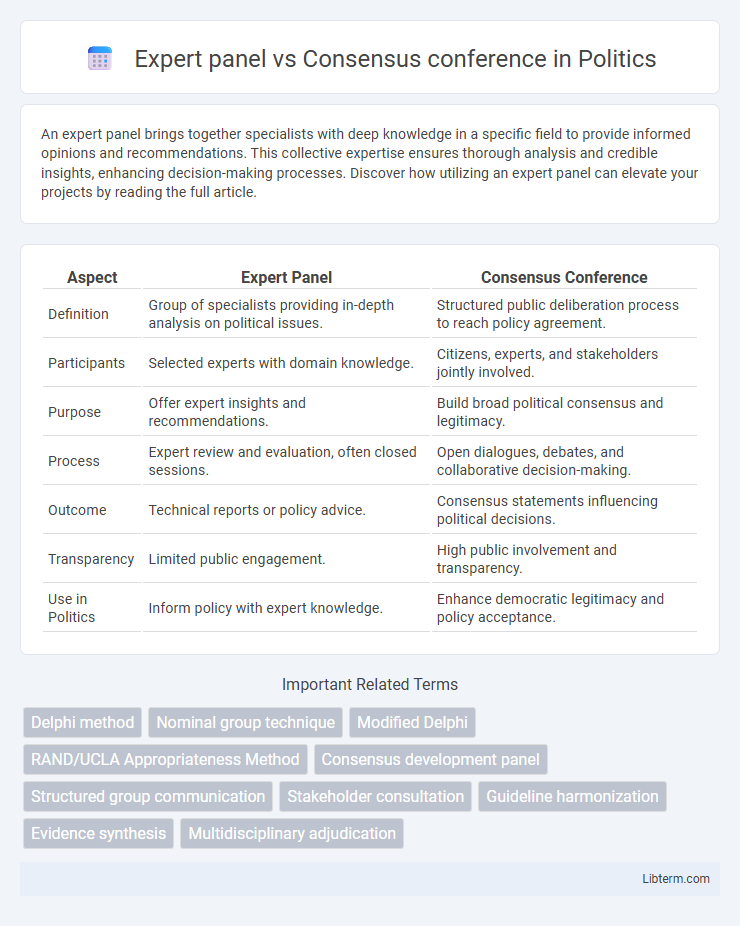An expert panel brings together specialists with deep knowledge in a specific field to provide informed opinions and recommendations. This collective expertise ensures thorough analysis and credible insights, enhancing decision-making processes. Discover how utilizing an expert panel can elevate your projects by reading the full article.
Table of Comparison
| Aspect | Expert Panel | Consensus Conference |
|---|---|---|
| Definition | Group of specialists providing in-depth analysis on political issues. | Structured public deliberation process to reach policy agreement. |
| Participants | Selected experts with domain knowledge. | Citizens, experts, and stakeholders jointly involved. |
| Purpose | Offer expert insights and recommendations. | Build broad political consensus and legitimacy. |
| Process | Expert review and evaluation, often closed sessions. | Open dialogues, debates, and collaborative decision-making. |
| Outcome | Technical reports or policy advice. | Consensus statements influencing political decisions. |
| Transparency | Limited public engagement. | High public involvement and transparency. |
| Use in Politics | Inform policy with expert knowledge. | Enhance democratic legitimacy and policy acceptance. |
Introduction to Expert Panels and Consensus Conferences
Expert panels consist of selected specialists who systematically evaluate evidence to provide informed judgments on complex issues, using structured methods like the Delphi technique to reach conclusions. Consensus conferences gather a diverse group of stakeholders, including experts and laypersons, to deliberate and agree on recommendations, promoting transparency and public engagement in decision-making. Both methods aim to synthesize knowledge, but expert panels emphasize specialized expertise, while consensus conferences incorporate broader perspectives for comprehensive consensus development.
Defining Expert Panels
Defining expert panels involves assembling a group of specialists with diverse knowledge who evaluate evidence and provide recommendations on specific topics or practices. These panels prioritize evidence-based insights and expert judgment to address complex issues, often influencing clinical guidelines or policy decisions. Unlike consensus conferences, expert panels typically emphasize individual expert input before collaborative summary, ensuring rigorous analysis and focused expertise.
Understanding Consensus Conferences
Consensus conferences are structured public forums where diverse stakeholders, including experts, policymakers, and citizens, collaborate to evaluate complex scientific or technological issues. Unlike expert panels that rely solely on specialists to provide insights, consensus conferences emphasize democratic participation and collective judgment to reach informed recommendations. This approach enhances transparency, accountability, and public trust in decision-making processes regarding emerging technologies or health policies.
Key Differences between Expert Panels and Consensus Conferences
Expert panels consist of specialists providing individual insights based on their expertise, often yielding diverse or conflicting viewpoints. Consensus conferences employ structured discussion and deliberation to achieve a unified agreement among experts on specific issues. The primary difference lies in the decision-making process: expert panels highlight expert opinions separately, while consensus conferences produce a collective, agreed-upon conclusion.
Selection Criteria for Participants
Expert panel participants are typically chosen based on demonstrated expertise, professional credentials, and contributions to the relevant field, ensuring a highly specialized group capable of in-depth technical evaluation. Consensus conference participants, by contrast, include a broader mix of stakeholders such as experts, laypersons, and sometimes policymakers, selected to represent diverse perspectives and foster inclusive dialogue. Selection criteria for consensus conferences emphasize representativeness, balance, and the ability to deliberate collaboratively, rather than solely on technical expertise.
Methodologies Employed in Both Approaches
Expert panels utilize a group of specialists who independently review evidence and share insights through structured discussions to reach conclusions, emphasizing depth of expertise and diverse perspectives. Consensus conferences involve a broader stakeholder group that combines expert testimony with public input, using facilitated dialogue and iterative feedback to achieve a collective agreement on complex issues. Both methodologies prioritize systematic evaluation but differ in participant diversity and engagement formats to enhance decision-making rigor.
Strengths of Expert Panels
Expert panels offer in-depth insights by leveraging the specialized knowledge of leading professionals, ensuring thorough and authoritative evaluations. They provide a flexible and dynamic platform for detailed discussions, allowing for real-time debate and refinement of ideas. Their ability to rapidly synthesize complex information enhances decision-making processes in specialized fields.
Advantages of Consensus Conferences
Consensus conferences offer the advantage of integrating diverse stakeholder perspectives, including experts, policymakers, and the public, which enhances the legitimacy and acceptance of resulting recommendations. They facilitate transparent deliberation processes that balance technical expertise with societal values, promoting well-rounded and democratically informed decisions. This inclusive approach helps identify potential ethical, social, and practical implications of complex issues that might be overlooked by expert panels alone.
Challenges and Limitations
Expert panels often face challenges such as potential bias from dominant personalities and limited diversity of perspectives, which can restrict the thoroughness of evaluations. Consensus conferences may struggle with the difficulty of achieving true agreement among participants, especially when diverse expert opinions lead to compromises that dilute the conclusions. Both methods are limited by the complexity of the topics discussed and the potential for groupthink, which can hinder objective decision-making and reduce the reliability of outcomes.
Choosing the Right Approach for Decision-Making
An expert panel gathers specialized professionals to provide in-depth analysis and recommendations on complex issues, leveraging their individual expertise for evidence-based decision-making. A consensus conference involves a diverse group of stakeholders collaborating to reach a collective agreement through structured dialogue, emphasizing inclusivity and shared understanding. Choosing between these methods depends on whether the decision requires specialized knowledge or democratic consensus, with expert panels suited for technical evaluations and consensus conferences best for integrating multiple perspectives.
Expert panel Infographic

 libterm.com
libterm.com